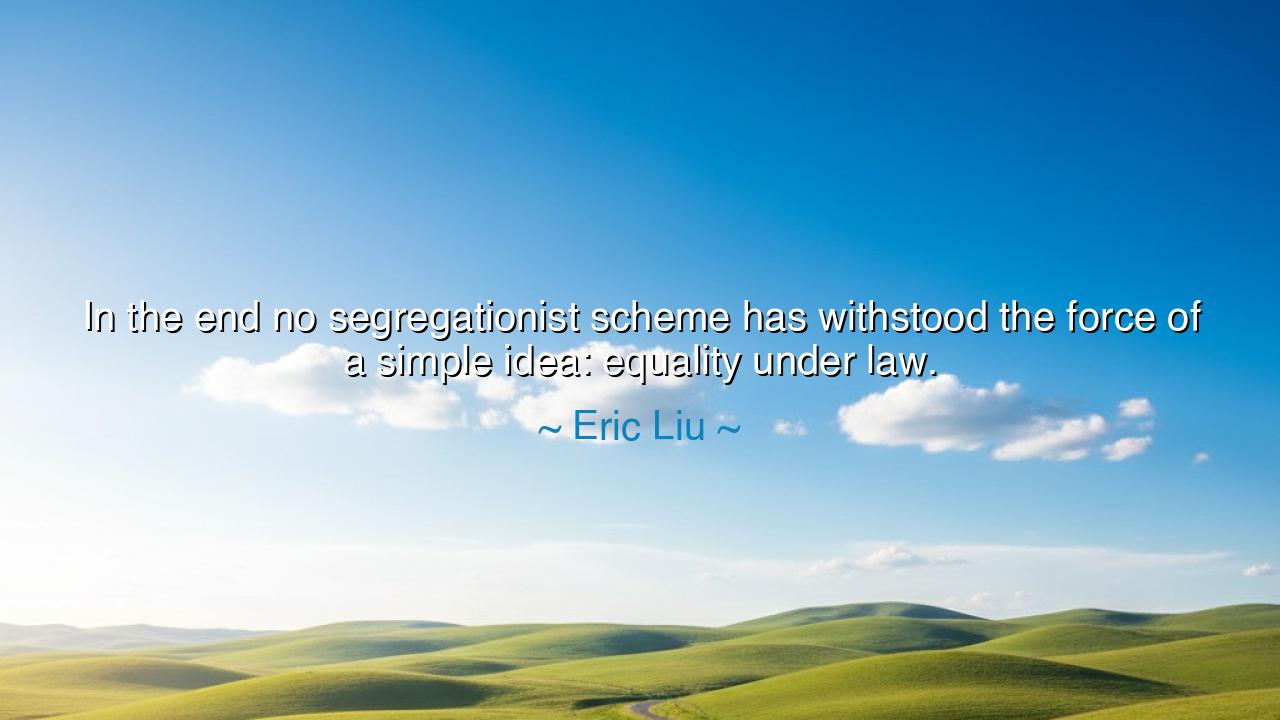
In the end no segregationist scheme has withstood the force of a
In the end no segregationist scheme has withstood the force of a simple idea: equality under law.






The words of Eric Liu—“In the end no segregationist scheme has withstood the force of a simple idea: equality under law.”—resound like a trumpet of justice across the centuries. They remind us that though the walls of oppression may rise high, though cruelty may cloak itself in custom, and prejudice may harden into policy, truth endures. For there is one force that tyranny cannot silence, one flame that no injustice can quench: the belief that all human beings are equal before the law. Liu’s words carry the voice of history—the echo of every struggle in which freedom triumphed not by might, but by the enduring power of a simple idea.
The origin of this idea lies deep in the soil of civilization itself. From the ancient codes of justice to the bold declarations of modern republics, humanity has always wrestled with the question of who counts as fully human, who is worthy of rights and respect. But each time oppression sought to divide—by race, by creed, by class—it eventually met its downfall before the same eternal truth: that no man or woman is born greater or lesser than another in dignity. Liu, an American thinker and advocate of civic equality, speaks as one who has seen how the tide of history bends slowly, yet inevitably, toward justice. His words are not only a reflection but a revelation of moral gravity: that segregation, in any form, is doomed because it stands against the laws of both nature and conscience.
The civil rights movement of the twentieth century stands as a monument to this truth. When the streets of Montgomery filled with marchers, when buses sat empty under boycott, when children faced police dogs and fire hoses in Birmingham, the segregationists believed their power would last forever. They had the law on their side—or so they thought. But justice, when voiced by the righteous, reshapes law itself. In 1954, with Brown v. Board of Education, the United States Supreme Court struck down the doctrine of “separate but equal.” And with that decision, the idea of equality under law pierced the heart of a centuries-old lie. No violence, no hate, could withstand it, for the truth was greater than the power that resisted it.
History offers other mirrors of this same victory. In South Africa, the cruel edifice of apartheid once seemed immovable—a fortress of race and fear. Yet it too crumbled, not through blood alone, but through the moral strength of those who believed in equality’s light. Nelson Mandela, imprisoned for twenty-seven years, emerged not with vengeance, but with the simple yet unstoppable conviction that all races could share one law, one nation, one destiny. The world watched as a people transformed their chains into symbols of freedom. The idea that Liu describes had, once again, triumphed—not through conquest, but through moral inevitability.
For segregation, in every age, is built on illusion—the illusion that difference can justify domination. But truth has a longer life than deception. Every empire built upon division has fallen, and every people denied their rights have risen again. The force of equality is quiet, yet unyielding; invisible, yet immovable. It moves not in armies, but in hearts; not in decrees, but in conscience. Those who oppose it may win battles for a time, but never the war, for they fight against the destiny of humankind itself.
The lesson, then, is clear and timeless: justice cannot be contained. Laws may falter, governments may fail, but the human spirit forever presses toward fairness and light. Each generation must renew this idea, defending it wherever fear and ignorance seek to cloud it. To believe in equality is not to utter a slogan, but to labor daily—to listen, to speak truth, to challenge wrongs even when they wear familiar faces. For as Liu reminds us, the promise of equality is not self-sustaining; it lives only in those who dare to uphold it.
So remember, my child: when you see division sown in the name of power, when you hear voices that call one group lesser than another, recall these words—no segregationist scheme can withstand equality under law. The oppressor’s triumph is fleeting, but justice is eternal. Be one who stands with the eternal. Guard this idea as you would guard a sacred fire—feed it with courage, shield it from despair, and carry it forward so that the generations to come may live in the full light of its truth. For in the end, it is not swords, nor wealth, nor fear that rule the world, but the quiet, invincible power of equality.






AAdministratorAdministrator
Welcome, honored guests. Please leave a comment, we will respond soon